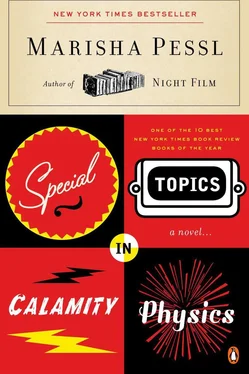None of us knew how we’d gotten there. We’d been unenthused with the idea of a camping trip from the beginning (including Leulah, who was always the first to go along with something) and now, here we were, in old jeans and uncomfortable hiking shoes, our distended camping backpacks rented from Into the Blue Mountaineering slumped against the van’s backseat windows like fat men who’d dozed off. An empty, nervous canteen, a tired bandana, Special K and ramen noodles rattling, the sudden evaporation of an entire can of contact solution, fitful whines of “Wait, who took my wind-resistant parka?”—it was a testament to Hannah’s influence, her startling yet subtle way of getting you to do something when you’d sworn to everyone, including yourself, you never would.
For reasons we never discussed, Nigel and I hadn’t said anything to the others about the articles he’d found or Violet May Martinez, though when we were alone, he hashed them over incessantly. True tales of unsolved vanishings tended to hang around the darkest confines of one’s mind long after one read about them — doubtlessly the reason why Conrad Hiller’s poorly written and scrappily researched 2002 account of two teenage kidnappings in Massachusetts, The Beautiful Ones , hung around the New York Times Bestseller List for sixty-two weeks. Such stories were as pervasive as bats, flying around at the slightest provocation, circling over your head, and though you knew they had nothing to do with you, that your fate would probably not be like theirs, you still felt a mixture of fear and fascination.
“Everyone have what they need?” sang Hannah as she retied the bright red laces on her leather boots. “We can’t come back to the truck, so make sure you have your backpacks and maps— do not forget the maps I gave you. It’s very important you know where we are as we hike. We’re following Bald Creek Trail, past Abram’s Peak to Sugartop Summit. It moves northeast and the campground’s four miles away from Newfound Gap Road, U.S. 441, that thick red line. See it on the map?”
“Yep,” said Lu.
“The first aid kit. Who has it?”
“Me,” said Jade.
“Fantastic.” Hannah smiled, her hands on her hips. She was dressed for the occasion: khaki pants, a long-sleeved black T-shirt, a puffy green vest, mirrored sunglasses. There was an enthusiasm in her voice I hadn’t heard since Fall Term. During Sunday dinners of late, we were all aware she wasn’t herself. Something very slight had shifted within her, a change difficult to pinpoint; it was as if a painting in one’s house had secretly been moved an inch to the right of where it’d hung for years. She listened to us as she always did, took the same interest in our lives, talked about her volunteer work at the animal shelter, a parrot she was hoping to adopt — but she didn’t seem to laugh anymore, that girlish giggle like a kick through pebbles. (As Nigel said, that haircut was an “eternal rain on her parade.”) She was prone to silent nods and abstracted stares, and I couldn’t tell if she simply couldn’t help this new reticence, if it was born of some unaccountable grief, which had rooted and spread inside of her like leafy liverwort, or if it was deliberate, so we’d all worry about what was troubling her. Certain June Bugs, I knew, willed themselves into abnormal moods that ranged from dour to delicate, simply so Dad would ask them, in tormented tones, if there was anything in the world he could do. (Dad’s actual response to such calculated behavior was to comment she looked tired and suggest making it an early night.)
After dinner, Hannah no longer put on Billie Holiday’s “No Regrets,” singing along in her low, bashful, tone-deaf voice, but sat meditatively on the couch, stroking Lana and Turner, not saying a word while the rest of us hashed over college, or Headmaster Havermeyer’s wife, Gloria, who was expecting twins and hauled her great stomach around campus with the same pleasure of Sisyphus with his boulder, or the outrageous story that broke in early March, that Ms. Sturds had been secretly engaged to Mr. Butters since Christmas (a pairing as dubious as an American Bison with a Grass Snake).
Efforts, both stealthy and obvious, to have Hannah join our conversations were like playing volleyball with a shot put. And she hardly ate the dinner she’d so painstakingly prepared, just pushed the food around her plate like an uninspired painter with a palette of dreary oils.
Now, for the first time in months, she was in a grand mood. She moved with the bright quickness of a sparrow.
“Are we ready?” she asked.
“For what?” asked Charles.
“Forty-eight hours of hell,” said Jade.
“For being at one with nature. Everyone have their maps?”
“For the twentieth time, we have the goddamn maps, ” said Charles, slamming the doors at the back of the van.
“Perfect,” Hannah said cheerfully and, making sure the doors were locked, she hoisted her enormous blue backpack onto her shoulders and began to walk away, briskly heading toward the woods at the opposite end of the parking lot. “And they’re off!” she shouted over her shoulder. “Old Schneider’s first out of the gate and holds the lead. Milton Black moves up on the outside. Leulah Maloney is coming up from fifth place. On the final turn it will be Jade and Blue battling it to the finish line.” She laughed.
“What’s she talking about?” asked Nigel, staring after her.
“Who the hell knows,” said Jade.
“Get going, thoroughbreds! We have to get there in the next four hours, otherwise we’ll be hiking in the dark!”
“Great,” said Jade, rolling her eyes. “She’s finally lost it. And she couldn’t lose it when we were buoyed by civilization. No, she had to lose it now, when we’re in the middle of nowhere, when it’s all snakes and trees and no one to come to our rescue but a fleet of friggin’ rabbits.”
Nigel and I looked at each other. He shrugged.
“What the hell?” he said. Flashing his tiny smile, a pocket mirror catching light, he started after her.
I held back, watching the others. For some reason, I didn’t want to go. I felt, not dread or apprehension, only an awareness that something grueling was looming in front of me, something so vast I couldn’t see all of it, and I didn’t know if I had the strength to take it on (see Nothing but a Compass and an Electrometer: The Story of Captain Scott and the Great Race to Claim Antarctica , Walsh, 1972).
Tightening the straps of my backpack, I headed after them.
A few yards in front of me, at the opening of the trail, Jade tripped on a root. “Oh, stunning. Simply stunning,” she said.
The northwest passage of Bald Creek Trail (a dotted black line on Hannah’s map) started out amiably enough, broad-shouldered as Mrs. Rowley, my second-grade teacher at Wadsworth Elementary, puffy with mulch and late afternoon sunshine, and fine, wispy, flyaway pines like the hair loosened from her ponytail at the end of the day. (Mrs. Rowley possessed the enviable knack for turning all “frowns upside down,” and all “snuffles into smiles.”)
“Maybe this isn’t so bad,” said Jade, turning around and grinning as she trudged along in front of me. “I mean it is kind of fun.”
An hour later, however, after Hannah’s yell for us to “keep right at the fork,” the road revealed its true character; it resembled not Mrs. Rowley, but the prickly Ms. Dewelhearst of Howard Country Day who dressed in dirt browns, with a posture taking cues from an umbrella handle and a face so withered she looked more walnut than human. The trail shriveled, forcing us to proceed single file and in relative silence as we skirted past painful brambles and weeds. (“Not a twitter during the examination or I’ll hold you back a grade and your life will be in ruins forevermore,” said Ms. Dewelhearst.)
Читать дальше












